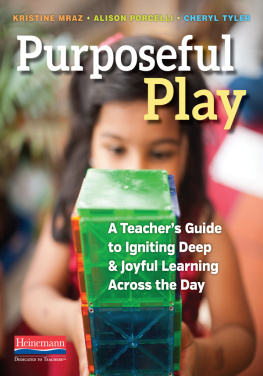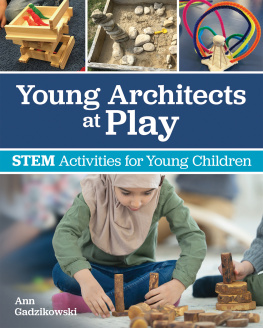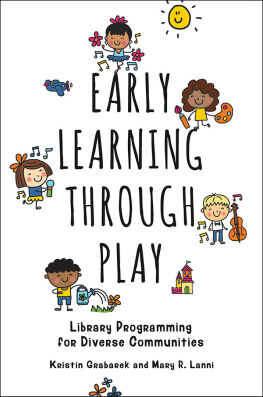
Published by Redleaf Press
10 Yorkton Court
St. Paul, MN 55117
www.redleafpress.org
2015 by Jeff A. Johnson and Denita Dinger
All rights reserved. Unless otherwise noted on a specific page, no portion of this publication may be reproduced or transmitted in any form or by any means, electronic or mechanical, including photocopying, recording, or capturing on any information storage and retrieval system, without permission in writing from the publisher, except by a reviewer, who may quote brief passages in a critical article or review to be printed in a magazine or newspaper, or electronically transmitted on radio, television, or the Internet.
First edition 2015
Cover design by Jim Handrigan
Cover photograph by STEFANOLUNARDI/iStock/ThinkStock
Interior design by Ryan Scheife, Mayfly Design
Typeset in the Alberta MT and Myriad Pro typefaces
Library of Congress Cataloging-in-Publication Data
Johnson, Jeff A., 1969-
Lets all play : a group-learning (un)curriculum / Jeff A. Johnson, Denita Dinger.
pages cm
Summary: Lets All Play provides all-new adventures that support childrens social skill development through thoughtful group play, interaction, and conversation. This book also encourages you to reflect on the value of childrens play through deep thinking activitiesProvided by publisher.
ISBN 978-1-60554-365-9 (e-book)
1. PlayUnited States. 2. Early childhood educationUnited States. 3. Early childhood educationCurriculaUnited States. I. Dinger, Denita. II. Title.
LB1139.35.P55J65 2015
790.0973dc23
2014019838
To mistakes, failures, patience, and tenacity, for without them I would have missed so many opportunities
Denita
To Tasha, my One True Love and favorite playmate
Jeff
The human brain is an apparatus, first and foremost, for dealing with the social environment.
Judith Rich Harris, The Nurture Assumption: Why Children Turn Out the Way They Do
Abundant research exists on the importance of social skills for success in school. Whole children attend school; they dont just send their brains along. Nurturing childrens social and emotional skills in preschool enables them to profit from school instruction. Children who thrive in preschool are prepared to become members of a classroom community where the individuals needs come after the needs of the groupa tough lesson for young children. Children who do well in preschool listen to directions, pay attention, solve disputes with words, and focus on tasks without constant supervision. Recent research suggests that they learn these skills through playful activities.
Kathy Hirsh-Pasek, Roberta Michnick Golinkoff, Laura E. Berk, and Dorothy G. Singer, A Mandate for Playful Learning in Preschool: Presenting the Evidence
Contents
Thanks to photographer Leslie Dionne (youre a FWP, Leslie!), Sachelle Fidler, and the rest of the gang at Little Munchkins Preschool Center for their help with photos. Thanks to Brittney Mendiola and Cheryl Mendiola at Tuggys Tots Preschool for the photos they provided. Thanks to Lori Atchison of Lori Atchison Photography (www.latchphoto.com) for the photos she provided. Thanks to the gang at Redleaf Press for letting us do another book together. Thanks to all the folks whove supported our previous efforts and helped with this project.
Thank you to my dad for encouraging me to chase my dreams and for teaching me the importance of optimism, relationships, and a full tank. Denita
Thanks to Tasha, Starbucks, and rum. Jeff
We humans are social creatures. We are driven to connect and interact with each other. Our brains need social contact.
Social skills are skills we will use throughout the entirety of our lives, yet in many early learning settings, playthe primary way young children practice and hone skillsis disappearing and being replaced with an unrelenting rush to early academics in preparation for school and the high-pressure, high-stakes testing that drives it.
Social skills are vital because they help kids prepare not only for all the human-to-human interactions to come in their lives but also for school.

Importantly, not only do cognitive and social skills reinforce one another, but social skills can actually lead to better cognitive skills, especially for children with average cognitive abilities. Children with advanced social skills may be better at getting additional information from teachers, understanding others points of view, cooperating with teachers and peers, and displaying initiative in the classroom. A large body of research documenting the predictive value of preschool childrens social maturity for later school success indicates that school readiness should not be assessed just in terms of cognitive attainments but also in terms of social attainments that forecast childrens adjustment to formal schooling.
Kathy Hirsh-Pasek, Roberta Michnick Golinkoff, Laura E. Berk, and Dorothy G. Singer, A Mandate for Playful Learning in Preschool: Presenting the Evidence

Ask a few kindergarten teachers: most likely, theyll say they are more concerned with social skills than academic skills.

When kindergarten teachers are surveyed about their students, they say that the biggest problem they face is not children who dont know their letters and numbers; it is kids who dont know how to manage their tempers or calm themselves down after a provocation.
Paul Tough, How Children Succeed: Grit, Curiosity, and the Hidden Power of Character

This book is about playful ways to support children while they develop and practice social skills. It is a follow-up to our 2012 book, Let Them Play: An Early Learning (Un)Curriculum, and our 2013 book, Lets Play: (Un)Curriculum Early Learning Adventures, and is intended for early learning professionals and families who want to support hands-on, child-led, play-based learning. It helps adults accustomed to rigidly structured, adult-led early learning curriculum ease into an (un)curriculum that supports good old-fashioned play and trusts kids as learners. Easing into an (un)curriculum is important, because for many people, the idea of giving up control and letting children lead is very scary.
Think of the following information as the books FAQ page. If an (un)curriculum is new to you, the FAQs will bring you up to speed.
What is an (un)curriculum?
An (un)curriculum is hands-on, child-led, play-based learning supported by the preparation, encouragement, and facilitation of an adult. Here are the principles of an (un)curriculum:
An (un)curriculum is supported by brain-development research.
An (un)curriculum nurtures the individual child.
An (un)curriculum sees everything as a learning opportunity.
In an (un)curriculum, the job of the caregiver is to see learning moments and make the most of them, building on the childs prior knowledge and life experience.
An (un)curriculum is based on childrens needs, likes, and interests.
Next page






